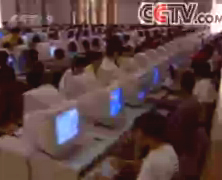 It' s September 1, a special day for millions of Chinese students, especially those who are going to enroll in Beijing' s universities. Young people from all around the country come to the capital of China, dreaming of a brand new chapter in their lives. It' s September 1, a special day for millions of Chinese students, especially those who are going to enroll in Beijing' s universities. Young people from all around the country come to the capital of China, dreaming of a brand new chapter in their lives.
But it' s different from previous years. The vast square in front of the Beijing railway station is dotted with temporary service centers organized by dozens of private universities and colleges. At the exit, a team of newly arrived students is led to the service center of the Beijing Renwen University.
Thanks to the careful arrangements and good service provided by the staff from the university, the students have no troubles at all joining their new family. More importantly, they get a good first impression of the not so familiar private university where they will live and study for three or four years. Besides Beijing Renwen University, a few dozen other private institutes are busy as well, receiving new students. These people are the front line troops, there to welcome and win the confidence of the new admissions, and promote their university to potential customers.
When they have completed the registration procedures and had a break, the new students and their parents are taken to the parking lot near the railway station.
Driving eastward, the van carries the students to the place where their higher education will start. It takes a little more than half an hour to reach the campus located in the outlying Tongzhou district of Beijing. With the opening of the university gate, the students' enter a quiet and spacious compound. Their hearts cannot help but quicken. For those who have managed to get to Beijing to kick off their university education, the private university embodies all their hopes, and a small measure of uncertainty.
Wang Tuqiang, a senior educator deeply involved in the reform process in Chinese higher education sector, is the executive president of Beijing Renwen University.
The increasing demand for quality higher education from the great number of young people, and even adults, has acted as a catalyst for the reemergence of private universities and colleges in China after more than three decades of disappearance.
There has been no royal road for the comparatively small and poorly funded private institutions. Laws and regulations have favored the development of public universities for years. And the people who have believed that more educational opportunities would contribute a lot for the country have struggled with a lack of funding, no social support and even considerable prejudice from the public and various sectors. However, the dream of helping more Chinese young people receive higher education has kept them persistently devoted to the cause.
 From the very beginning, Wang Tuqiang's predecessors had a clear understanding of the kind of private university they wanted to establish. They did not want a "polytech"-type institution offering only some training courses. They wanted a comprehensive university with a number of colleges offering majors that could meet various demands from different people. Beijing Renwen University already has eight colleges and offers 31 majors.
From the very beginning, Wang Tuqiang's predecessors had a clear understanding of the kind of private university they wanted to establish. They did not want a "polytech"-type institution offering only some training courses. They wanted a comprehensive university with a number of colleges offering majors that could meet various demands from different people. Beijing Renwen University already has eight colleges and offers 31 majors.
There is also an Art College at Beijing Renwen University, which offers several majors including painting, advertising media and sculpting. In a pencil sketching class, a dozen students are attentive to their work, depicting the subject from different angles. They're sharpening their basic skills to help nurture precious inspiration for future works of art.
As for the teaching staff that are indispensable to anyone wanting to build a first class university, Wang Tuqiang has a practical philosophy.
First class teachers are a strong guarantee for quality education. And it is also important to provide the necessary equipment and the right environment for the students for whom study is the priority.
For the freshman, a good environment will ensure they develop good study habits. While those who have studied in the university for one or two years have a better understanding.
University life here is characterized by a rich abundance of after-class activities. The vigor and energy on the playing fields vividly illustrate the kind of life the students are leading at this university.
It is extremely encouraging to find that most of the students at Beijing Renwen University have a clear understanding of what they want, and what they have at the private institutes.
 Given the current number and scale of Chinese private universities and colleges, a law aimed at boosting further development took effect on September 1. The passing of this law is considered to be the government' s recognition of the legal status and growing importance of the private education in China.
Given the current number and scale of Chinese private universities and colleges, a law aimed at boosting further development took effect on September 1. The passing of this law is considered to be the government' s recognition of the legal status and growing importance of the private education in China.
The increasing number of private universities and colleges can better meet the growing demand for higher education in China. So the new law is timely to ensure their consistent development in terms of regulations and principles. They must be firmly set on the right road before they can present us with firm prospects for the future.
Nowadays, receiving higher education in China is not a privilege confined to only a few. There is a noticeable trend that all universities and colleges, including private ones, are forging ahead to meet the diversified demands coming from more young people. They are moving toward the ultimate dream - where education is accessible to everyone who wants it.
|